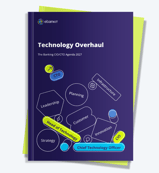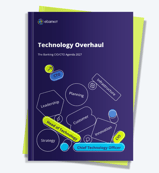AI is no longer just a buzzword; it’s rapidly becoming a foundational element of digital transformation across financial services. In a thought-provoking panel moderated by Nuno Pereira, Technical Director at ebankIT, three representatives from leading financial institutions shared how their organizations are embracing AI, not just as a tool, but as a strategic enabler.
Beyond the buzz: What AI projects are financial institutions actually prioritizing?
Recorded on June 11, 2025
![]()
![]()
![]()
![]()
SPEAKERS
SUMMARY
Key topics
AI is helping banks do things faster, cheaper, and better. From automating routine tasks to optimizing workflows, it's seen as a once-in-a-generation opportunity to transform operations.
Advanced models like neural networks are proving highly effective in identifying and managing risks. AI is enhancing fraud detection, compliance monitoring, and predictive analytics.
The scalability and power of cloud-based platforms, combined with the security and control of in-house development, is a necessary balance when dealing with sensitive financial data.
Transcript
00:00:00 - Introduction
The panel discussion started with Nuno Pereira introducing the topic of AI that is widely recognized as a transformative force, akin to an industrial revolution.
Nuno highlights that it’s no longer just a buzzword, financial organizations are now moving from curiosity and fear to practical implementation.
The technology is seen as autonomous, self-improving, and capable of delivering non-incremental, radical change.
Atul Varde, CIO and CDO at Servus Credit Union, outlined three key pillars where AI is already making a significant impact in banking. Firstly in operational efficiency. AI enables banks to do things faster, cheaper, and better. It's a seen as a once-in-a-generation opportunity to streamline operations. Secondly, risk management, neural networks and AI models are showing promising results in identifying and managing risks. Thirdly, customer-facing applications divided into transactional banking which is easier to implement and advisory banking which is more complex but potentially more impactful.
Dorian Petrovici from Banca Transilvania emphasized the shift in how AI is perceived. While everyone is talking about it, fewer truly understand it, and even fewer have implemented it effectively. Still, he was clear: AI is a game changer. Technology is evolving rapidly, and its impact is already being felt across the industry.
Martin Schmid from Hypothekarkbank Lenzburg (HBL) highlighted that banks must adopt AI not necessarily to outperform others, but to stay competitive. If they don’t, they risk being left behind as the entire industry moves forward. He also emphasized how AI is transforming the customer experience. From helping clients find the right products to surfacing hard-to-find information, AI is making banking more intuitive and accessible.
AI plays a growing role in personalized recommendations and product sales, enabling banks to better understand and serve their customers’ needs in real time.
Atul Varde of Servus Credit Union highlighted that the first real access point to AI is through employees. By making their work easier and more efficient, AI becomes a powerful productivity booster.
00:10:00 - AI empowers people and processes
Rather than focusing on whether AI will replace jobs, Atul emphasized that the real opportunity lies in amplifying human potential.
He shared several compelling examples of how AI tools are already delivering value across departments. In wealth management, AI is used to automatically transcribe KYC meetings, eliminating the need for manual note-taking and saving countless hours. In marketing, teams have leveraged AI to create entire digital campaigns, achieving high-quality results while significantly reducing costs. Across the organization, AI acts as a supercharged internal search engine, helping staff quickly find documents and information that would otherwise take time to locate.
00:15:00 - Real AI projects in financial institutions
As the discussion progressed, the panelists shared how their institutions are actively implementing AI, not just as a concept, but as a strategic enabler embedded across their operations.
At Banca Transilvania, AI is already delivering results. The bank was one of the first in Romania to introduce AI in customer communications, using RPA and large language models. Today, 60% of their customers interact through AI-powered self-service tools and this is just the beginning.
Dorian highlighted that AI implementation is decentralized, with multiple projects running simultaneously across departments. One example is their wallet application, where an AI-powered chat assistant helps users navigate and understand the platform. Future initiatives include process automation and expanding AI’s role in both customer and internal operations.
Meanwhile, HBL is also making strides in AI adoption. Their focus includes customer guidance tools that help users find information like mortgage steps or how to lock a card. Machine learning models are already in production for fraud detection, and customer affinity models predict which products a customer might be interested in.
Atul Varde echoed the importance of machine learning and shared a similar success story. One of their engineers independently learned XGBoost and trained a model using five years of fraud data.
The result was a dramatic reduction in false positives and a model that could be reused for future projects, such as the launch of the Canadian Real-Time Rail (RTR) payments.
Atul Varde also spoke about their partnership with Salesforce, which led to the development of an end-to-end AI agent for credit card services. While the use case itself was straightforward, the real value came from the team learning how to build and deploy AI solutions.
Looking ahead, they see potential in contact center optimization, where AI agents could handle routine queries and escalate complex ones to human agents, offering tremendous ROI in high-turnover environments.
00:20:00 - AI risk management in banking
00:25:00 - Human centric AI
The discussion centered on the transformative role of AI in the banking industry. The speakers agreed that AI is not just a passing trend but a fundamental shift—comparable to an industrial revolution—that will deeply embed itself into nearly every banking process within the next 3 to 5 years. They projected that up to 80% or more of banking operations could be AI-driven in that timeframe.
A key concept highlighted was "agent AI", described as an assistant that knows the user well enough to act on their behalf. If realized, this could reshape societal concepts of work, jobs, and money.
Despite the enthusiasm, there was a strong emphasis on trust and human interaction. Banking has always been a people-centric business, and trust—rooted in human relationships—remains its core currency. The speakers advocated for "human-centric AI", where AI serves to enhance human capabilities rather than replace them.
They also noted that while AI will speed up processes (e.g., getting a mortgage in a day instead of weeks), human contact will still be essential. The consensus was that AI will support and streamline banking, but people will continue to be at the heart of the industry.




%20without%20SAM%20-%20Maturity%20Level%20-%202-KO%20edit.webp?width=160&height=57&name=67768-ebankIT%20Platform%20-%20CMMI%20Development%20V2.0%20(CMMI-DEV)%20without%20SAM%20-%20Maturity%20Level%20-%202-KO%20edit.webp)
